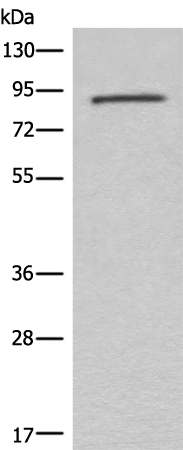
| WB | 咨询技术 | Human,Mouse,Rat |
| IF | 咨询技术 | Human,Mouse,Rat |
| IHC | 1/50-1/200 | Human,Mouse,Rat |
| ICC | 技术咨询 | Human,Mouse,Rat |
| FCM | 咨询技术 | Human,Mouse,Rat |
| Elisa | 1/2000-1/10000 | Human,Mouse,Rat |
| WB Predicted band size | 94 kDa |
| Host/Isotype | Rabbit IgG |
| Antibody Type | Primary antibody |
| Storage | Store at 4°C short term. Aliquot and store at -20°C long term. Avoid freeze/thaw cycles. |
| Species Reactivity | Human, Mouse |
| Immunogen | Fusion protein of human C7 |
| Formulation | Purified antibody in PBS with 0.05% sodium azide and 50% glycerol. |
+ +
以下是关于TNK2(ACK1)抗体的3篇参考文献及其摘要概括:
1. **文献名称**:*ACK1/TNK2 regulates integrin-mediated signaling and matrix assembly*
**作者**:Mahajan, K. 等人(2010)
**摘要**:该研究通过使用特异性TNK2抗体,揭示了ACK1激酶在整合素信号通路中的作用,发现其通过磷酸化下游靶点调控细胞黏附和胞外基质的组装,影响肿瘤细胞迁移。
2. **文献名称**:*Targeting TNK2/ACK1 in castration-resistant prostate cancer*
**作者**:Zhang, X. 等人(2015)
**摘要**:研究利用TNK2抗体进行免疫沉淀和功能实验,证明TNK2在去势抵抗性前列腺癌中通过激活AR信号通路促进耐药性,抑制TNK2可减少肿瘤生长。
3. **文献名称**:*ACK1 kinase inhibition expands treatment options for EGFR mutant lung cancer*
**作者**:Kurimchak, A. 和 Brown, J. (2017)
**摘要**:通过开发高特异性TNK2抗体,研究发现抑制ACK1可增强EGFR突变肺癌细胞对靶向治疗的敏感性,为克服耐药性提供新策略。
4. **文献名称**:*Structural basis of TNK2 kinase activation and inhibition*
**作者**:Srinivasan, S. 等人(2020)
**摘要**:结合X射线晶体学与TNK2抗体阻断实验,解析了ACK1激酶活性构象及其抑制剂结合机制,为设计特异性抗体药物奠定结构基础。
这些文献涵盖了TNK2抗体在机制研究、癌症治疗及结构生物学中的应用。
The TNK2 antibody is a research tool designed to target the non-receptor tyrosine kinase TNK2. also known as activated CDC42 kinase 1 (ACK1). TNK2 is a signaling protein involved in regulating cell proliferation, survival, and migration through pathways like PI3K/AKT and RAS-MAPK. It contains distinct structural domains, including an SH3 domain, kinase domain, and CDC42-binding site, enabling interactions with downstream effectors. Dysregulation of TNK2 has been linked to cancer progression, particularly in prostate, breast, and lung cancers, where it promotes oncogenic signaling and therapy resistance.
Antibodies against TNK2 are widely used to study its expression, localization, and function in both normal and diseased tissues. They enable techniques such as Western blotting, immunohistochemistry, and immunofluorescence to assess TNK2 protein levels or activation status (e.g., phosphorylation at Tyr284). Some antibodies are designed to distinguish between phosphorylated and non-phosphorylated forms, aiding in pathway activity analysis. Validated TNK2 antibodies are critical for exploring its role as a potential therapeutic target, especially given ongoing preclinical studies targeting TNK2 with small-molecule inhibitors. Researchers rely on commercially available antibodies from suppliers like Cell Signaling Technology, Abcam, and Santa Cruz Biotechnology, often verifying specificity using knockout cell lines or siRNA-mediated depletion.
×